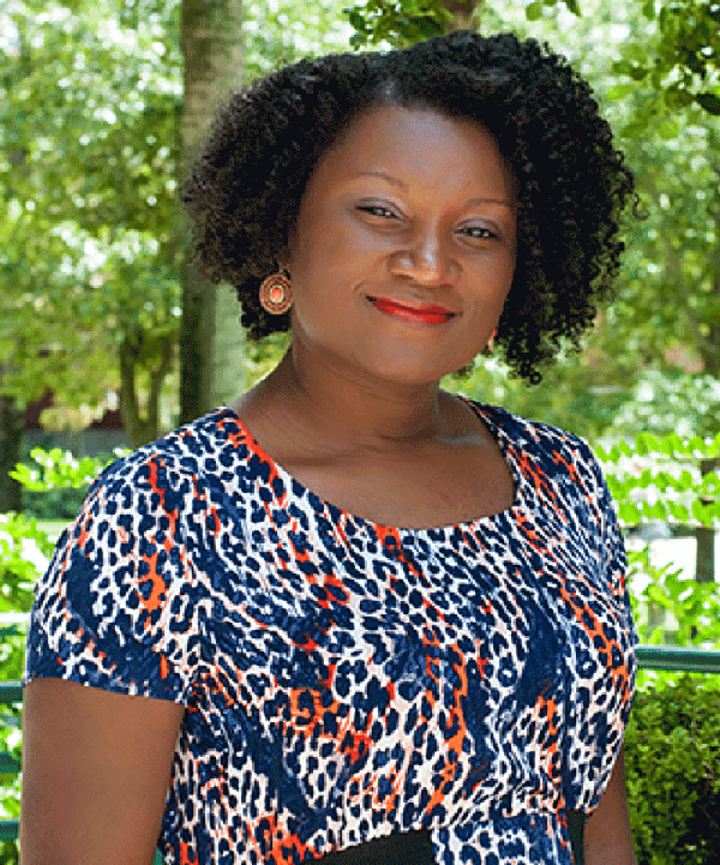J. Scott Angle
Contributor
LaToya O’Neal cares about your community in part because she’s from a place that’s like it. She knows that although the Department of Health has COVID-19 vaccines, they’re not available 24/7 or within a few minutes’ distance and that you may have questions before deciding what’s best for you and your family.
O’Neal has been spending time in your community because she doesn’t want you left behind as millions of Americans get vaccinated.
It’s personal for her. She saw up close how type 2 diabetes and hypertension limited the ability of the grandfather who raised her in rural Mississippi to enjoy his golden years. It didn’t have to be that way. He had the power to make different choices to take charge of his health. So do you, and she wants a different outcome for you and your neighbors.
Her work as a University of Florida Institute of Food and Agricultural Sciences faculty member focuses on making your county a healthier place through science-based information. Right now her focus is COVID-19 vaccines. But for the past four years, she’s been visiting rural North Florida to better understand how to curb obesity, diabetes, hypertension and other health challenges in places that don’t have boutique grocery stores, 24-hour health clubs and sprawling medical centers.
She is not parachuting into your community for a one-off before retreating to her lab. Like the scientists who started five years ago working on the technology that turned out to be a key to creating the first approved COVID-19 vaccine, O’Neal started working on rural public health long before the need to promote COVID-19 prevention and vaccinations.
O’Neal won’t try to tell you what to think. The population she wants to reach are what we might call wait-and-seers—maybe that’s you? You may not have gotten the vaccine because either it hasn’t been convenient or because you want to see how vaccinations have worked out for your friends and neighbors.
In coming months, you can expect to see O’Neal and her team members outside your church, at a town hall-type meeting, organizing local leaders into a coalition focused on your health and driving your main streets and back roads.
O’Neal’s approach is to form what she calls rural health disparities coalitions—health care, non-profit, social service and faith groups that come together to extend to you the opportunities to take charge of your health that city residents already have.
In her past work in Bradford, Putnam, Suwannee and Taylor Counties, O’Neal partnered with pastors, connecting with people through their faith communities. The folks she reached have taken positive strides towards better health. They have planned more meals, taken a closer look at nutrition labels and dietary recommendations, made fewer trips to the fast-food drive-through window, eaten more fruits and vegetables, drank more water and exercised more. O’Neal has received national recognition for her local work.
The strength of land-grant universities like UF is relevancy through the kind of two-way outreach O’Neal does. As a land-grant academic she wants to know what questions you have about vaccination. She also wants to learn from you and share what she learns with other rural communities.
If you want to connect with her and her team, please email her at latoya.oneal@ufl.edu.
In Suwannee, Taylor, Hamilton and Lafayette Counties, pastors and other community leaders are joining these coalitions as public health messengers.
O’Neal’s grandfather had limited access to medical care because he chose to live in a rural community. O’Neal doesn’t want you to have to make that tradeoff. O’Neal has partnered with a UF Health mobile clinic that can bring experts, vaccines and information to your community.
Vaccines have arrived in your community. Perhaps vital information to accompany them has not.
It’s not just about COVID-19. Some day there may be another pandemic, and a new vaccination campaign. O’Neal doesn’t want rural North Florida left behind, now or in the future.
J. Scott Angle is the University of Florida’s Vice President for Agriculture and Natural Resources and leader of the UF Institute of Food and Agricultural Sciences (UF/IFAS).

